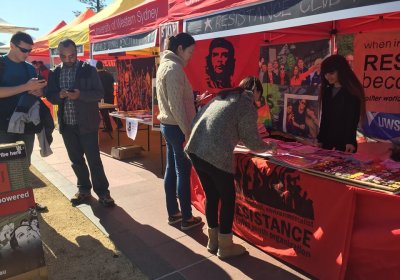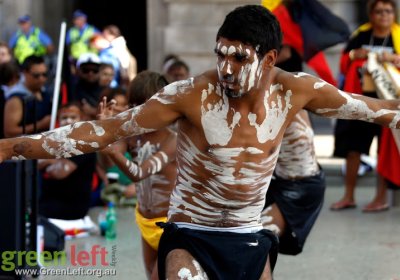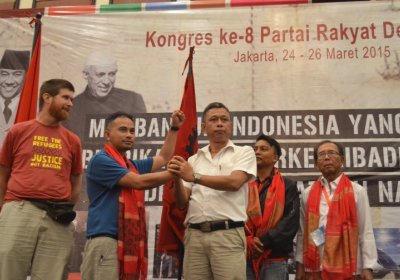Students are returning to university campuses for second semester classes and Green Left Weekly is there too. This is part of a special campaign the paper is waging to boost distribution, and in particular to raise the number of campaigners involved.
One example is Griffith University in Brisbane. A number of new members of the Socialist Alliance were studying at Griffith and decided to begin regular distribution of Green Left Weekly towards the end of last semester. Recently they were back for the university open day as preparation for second semester.
Alex Bainbridge
 The anniversary of the death in custody of 22-year-old Aboriginal woman, known as Julieka Dhu, was marked around Australia on August 4.
Dhu died while in police custody in Western Australia’s Pilbara region for non-payment of fines that totalled about $1000.
The anniversary of the death in custody of 22-year-old Aboriginal woman, known as Julieka Dhu, was marked around Australia on August 4.
Dhu died while in police custody in Western Australia’s Pilbara region for non-payment of fines that totalled about $1000.
Green Left Weekly supporters around the country have begun an important six-week campaign to boost circulation of the paper.
We’re asking supporters to help us out by taking a small bundle of papers to sell to friends and workmates. In Sydney, several supporters are now doing this: they are finding great interest — sometimes from unexpected quarters.
"Shamed", "human", "citizen".
These were some of the labels people wrote across their mouths at the silent protest in Perth against the chilling effects of the new Border Force Act.
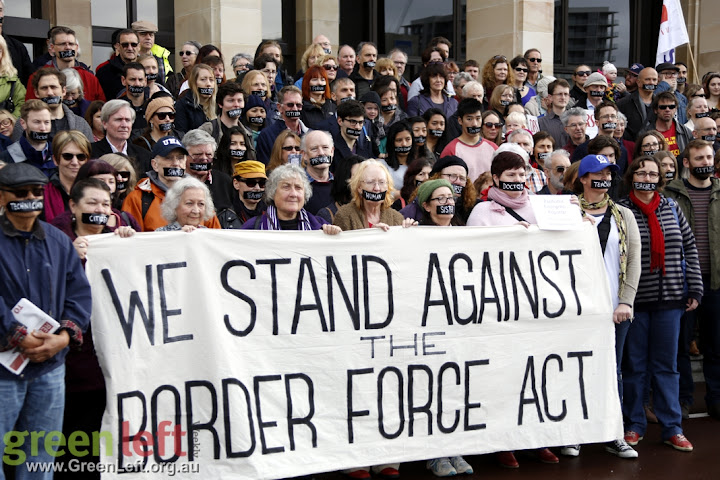

“I'd cross the train tracks for this paper.” That was the comment made last week by a friendly man who comes into the Perth Activist Centre every week without fail to buy a copy of Green Left Weekly.
We had to explain to him that he would have to come back the next day, since a courier mistake meant the papers hadn't come in on time. “No problem,” he said. “I'd do whatever it takes, this is the best paper.”
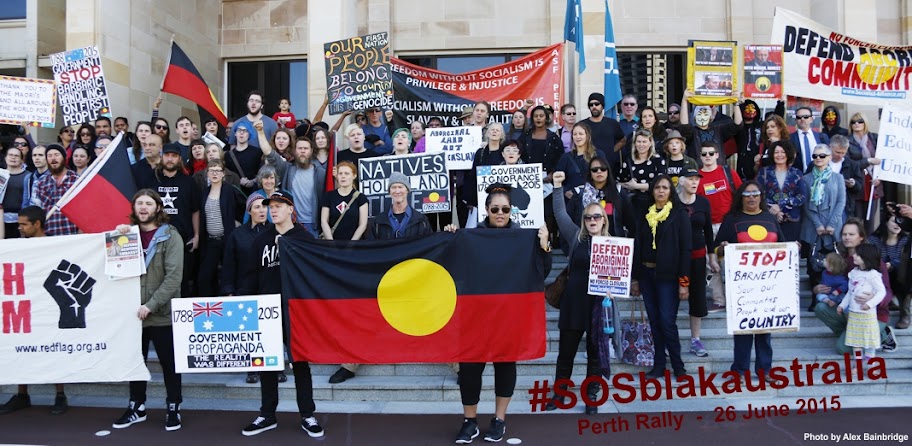 Over 100 people rallied in front of WA Parliament House on June 26, 2015 as part of the third #SOSblakaustralia "call to action" to stop forced closures of Aboriginal communities.
Speakers included Aboriginal heritage advocate Clayton Lewis and Greens MLC Robin Chapple. Bella Bropho from the Swan Valley Nyungar Community gave a Welcome to Country.
Over 100 people rallied in front of WA Parliament House on June 26, 2015 as part of the third #SOSblakaustralia "call to action" to stop forced closures of Aboriginal communities.
Speakers included Aboriginal heritage advocate Clayton Lewis and Greens MLC Robin Chapple. Bella Bropho from the Swan Valley Nyungar Community gave a Welcome to Country.
The campaign against closure of Aboriginal communities and mobilisations against unconventional gas in Eastern Australia are some examples of growing campaigns that are successfully challenging the agenda of capitalist governments in Australia, according to the eleventh national conference of Socialist Alliance.
Perth City Council and WA Police raided the Nyoongar encampment at Matagarup (Heirisson Island) at 7am on June 18. Tents were seized, move-on notices issued and concrete barricades were erected at the car park entrance to try to deliver a terminal blow to the Matagarup Refugee Camp as the encampment is known.
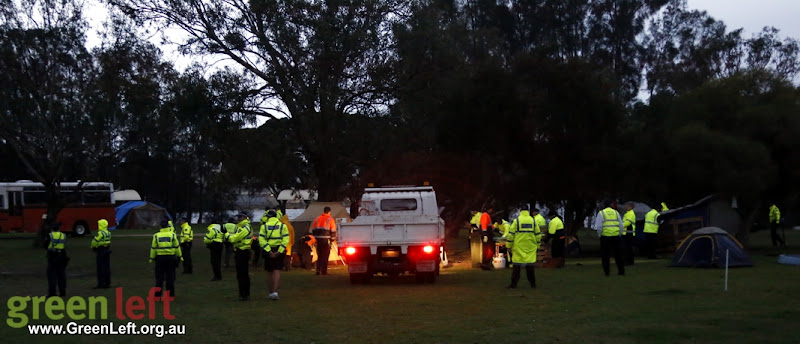 Police and council workers arrived in large numbers with trucks and equipment. More than 15 people had stayed overnight at the camp.
Police and council workers arrived in large numbers with trucks and equipment. More than 15 people had stayed overnight at the camp.
 Police and council workers arrived in large numbers with trucks and equipment. More than 15 people had stayed overnight at the camp.
Police and council workers arrived in large numbers with trucks and equipment. More than 15 people had stayed overnight at the camp.
The Socialist Alliance stands in full solidarity with the burgeoning movement against the forced closure of remote Aboriginal communities in WA.
This movement can win and if it does it will be a victory for all working people in Australia.
Without any consultation, the federal government announced in September that they would cut funding that, for more than 40 years, had been provided to support these communities. The state government, equally contemptuous in their lack of consultation, then announced that up to 150 communities would have to close.
Perth's rally against the forced closure of Aboriginal communities on April 23 began peacefully like any other. True, there were more police there than was necessary, but not enough to indicate the scale of intimidation and recklessness that was to come.
The left-wing People's Democratic Party (PRD) held its eighth congress in Jakarta from March 24-26. This was the first time its congress was held openly.
The open congress marks an important new stage of development for the party, which has a history of underground organising dating back to the era of the Suharto dictatorship that was overthrown in 1998.
 The far right Islamophobic “Reclaim Australia” movement burst onto the streets in what was the biggest racist mobilisation since the Cronulla riots, in 16 places across Australia on April 4. They were armed with swastika tattoos, Australian flags and a few simplistic slogans such as “No halal food”.
They were also met by counter protesters who stood up to reject racism, chauvinism and bigotry.
The far right Islamophobic “Reclaim Australia” movement burst onto the streets in what was the biggest racist mobilisation since the Cronulla riots, in 16 places across Australia on April 4. They were armed with swastika tattoos, Australian flags and a few simplistic slogans such as “No halal food”.
They were also met by counter protesters who stood up to reject racism, chauvinism and bigotry.
- Previous page
- Page 38
- Next page
